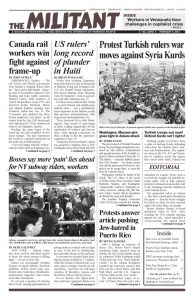SHERBROOKE, Quebec — The rail bosses and federal government were handed a stinging defeat when the three-and-a-half-month frame-up trial of locomotive engineer Tom Harding and train traffic controller Richard Labrie, both members of United Steelworkers Local 1976, and low-level former Montreal, Maine and Atlantic Railway manager Jean Demaitre, ended here Jan. 19. The 12-member jury declared the three former employees “not guilty” on all counts from the July 2013 derailment and explosion of a 72-car runaway oil train in Lac-Mégantic, Quebec.
Harding, the main target of the frame-up, was also acquitted on two lesser charges. The jury announced the verdict to a packed courtroom on the ninth day of deliberations.
“I am very happy with the verdict,” retired worker and Lac-Mégantic resident Jean Clusiault, told the media at the courthouse. Clusiault’s 24-year-old daughter, Kathy, was one of those killed at the Musi-Café near the tracks when the train derailed and exploded. “They treated these people horribly, like killers,” he said, referring to the three framed up men. “They broke their lives.”
Many people from Lac-Mégantic attended the trial. Clusiault was there every court day. When reporters asked him who he thought was guilty, he pulled a rumpled piece of paper from his pocket and started reading a list of high company officials, beginning with former CEO Edward Burkhardt.
“This is a victory for workers,” Gilbert Carette, a former Quebec highway maintenance department worker, told the Militant. “This tragedy, caused by company negligence and government deregulation of the rail industry, was placed on the shoulders of innocent workers.”
Carette is active in the Citizens and Groups Coalition for Rail Safety in Lac-Mégantic, which has been fighting for the federal and Quebec governments to build a railway bypass around the town.
“The Citizens Coalition,” said spokesperson Robert Bellefleur in a post-verdict press release, “has always insisted that the three employees were ordinary actors in a business scheme planned at high management levels to ensure maximum benefits for top company officials and shareholders of the oil and railway companies involved.”
Government frame-up unraveled
The rail bosses and the prosecution frame-up centered on the claim that Harding was criminally negligent and displayed “reckless disregard” for human life by not setting and properly testing a “sufficient” number of hand brakes when he parked the train that night. He was the only “crew” on the train. The bosses had gotten special dispensation from the government to operate with a one-person crew, to cut costs.
Labrie and Demaitre were charged with criminal negligence for supposedly not doing enough to prevent Harding from causing the disaster
In accord with company procedures, Harding had kept the lead engine running when he left the train for the night and also set hand brakes to keep the air brakes engaged to prevent the train from moving. During the night, firefighters unknowingly turned off the locomotive’s air brakes when they shut down the engine to extinguish a fire that was caused by substandard maintenance practices. Without air brakes the train later rolled down a 7-mile grade into the center of Lac-Mégantic and derailed.
In his final arguments, Charles Shearson, one of Harding’s lawyers, blew out of the water the prosecution’s claim that Harding had failed to secure the train. He walked through how Harding had followed the company’s general operating instructions and secured the train.
Shearson also emphasized the dangerous conditions Harding was forced to work under as a single-person “crew.”
The jury ruled for the defendants even though Judge Gaétan Dumas refused to give them a key document that contradicted the frame-up charges — the official Transportation Safety Board report on the cause of the disaster. This report states that 18 different factors were involved, many centering on the safety negligence of the railroad’s bosses, and no one single person can be blamed. “Our strategy was to bring the report’s conclusions in through the back door,” Thomas Walsh, Harding’s other lawyer, told the Militant.
Workers hail the verdict
Both the Teamsters union, which organizes the majority of freight rail workers in Canada, and the United Steelworkers, which organized workers on Montreal, Maine and Atlantic, issued statements backing the victory.
“This was the right verdict,” said Chris Yeandel, a Canadian Pacific engineer and chairman of Teamsters Locomotive Engineers Local 689.“I know about this. I run a train. I don’t make the policies of the company. I can’t be responsible for everything that happens because of the decisions others make.”
A court hearing will take place in Lac-Mégantic Feb. 5 to deal with regulatory charges still standing against Harding, Labrie and Demaitre, as well as some company officials. These charges were brought by Transport Canada under two federal laws, the Railway Safety Act and the Fisheries Act.
Most workers think the jury made the right decision. “In Lac-Mégantic, few expected a guilty verdict, or wanted one,” the Montreal Gazetteheadlined its story on the decision.
“Lac-Mégantic residents said it was the railway’s chairman, Ed Burkhardt, they wanted to see in handcuffs,” the National Postsaid. “He was never charged, but the railway faces similar criminal negligence charges. A trial date has not been set, but even if convicted, the only penalty for a company is a fine — one that would likely never be paid because MMA went bankrupt.”
Marie-Claire David contributed to this article.

